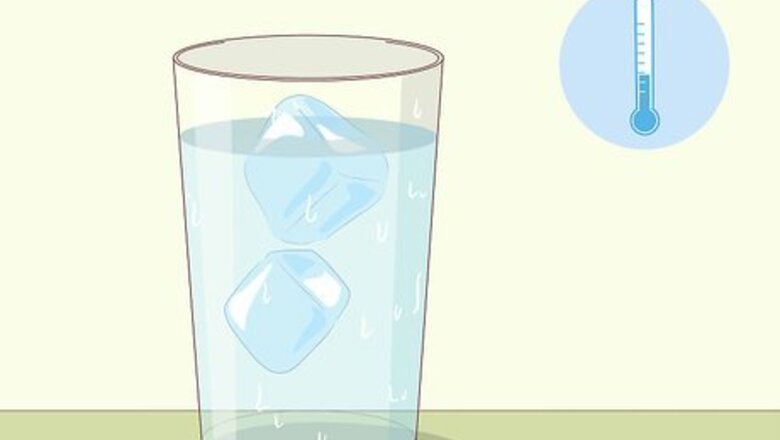
views
Have some cold water.
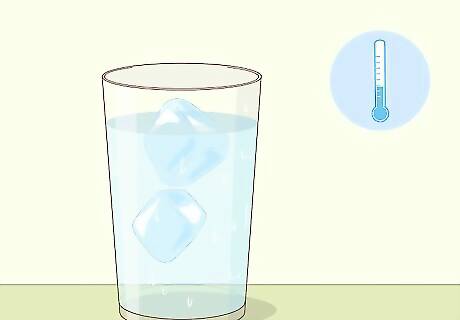
Nothing hits the spot quite like a cool glass of water. The exposure to something cold is going to wake you up. At the same time, staying hydrated is one of the best ways to keep your energy levels up. One of the first signs of dehydration is fatigue! If you start feeling sluggish, ask yourself when the last time you drank some water was!
Move around a bit.

A quick burst of activity will jumpstart you if you’ve been relaxing. Get up and do some jumping jacks, walk around while you’re on the phone at work, and go out of your way to take a short break every hour that you’re sitting. Engaging in some minor movement throughout the day will do wonders for your energy levels. Even something as small as doing 5 pushups, or stretching your calves out by standing on the balls of your feet, will give you a quick burst of energy. Spending time outside is always a great option. In fact, even a 15-minute walk through a park can do wonders for your energy.
Drink something caffeinated.

If you’re in a little bit of a slump, coffee or tea can help. It’s one of the most obvious tips out there, but it’s a popular option because it works. Just make sure that you don’t have any caffeine after 2 pm, or it may mess with your sleep cycle. Use caffeine judiciously as a solution here. If you overdo it, you may get a headache or feel irritable if you drink more than 4 cups of coffee a day. This is a good option for a short burst of energy, but keep in mind that you’re going to lose a little bit of steam after the caffeine wears off.
Have a healthy snack.
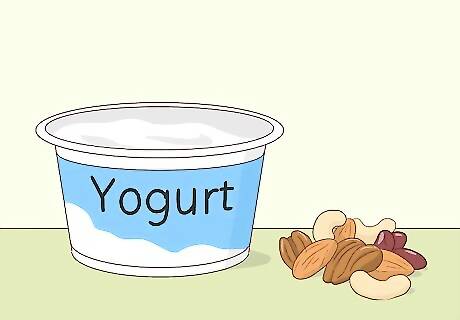
If your body is low on energy, refuel with a nutritious snack. The trick here is to opt for foods with a low glycemic index. High glycemic index foods are high in sugar, which can cause your energy levels to lag and stutter. Grab a yogurt, some nuts, carrot sticks, or some other natural snack to fill back up. The more processed the food is, the less likely it is to give you the boost you’re looking for.
Turn the thermostat down.
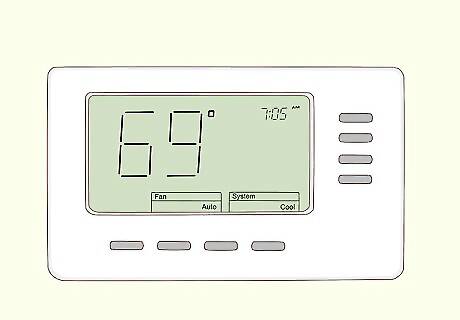
If you’re at home, set the temperature to 60–69 °F (16–21 °C). Warm temperatures tend to naturally make us a little low-energy, and some cool air will help you power through the day. If you’re at work or something like that and it’s a little cold out, take your next break outside to get a breath of fresh air.
Chew some gum.

If you need a boost, chewing sugar-free gum may help. There’s some evidence that chewing gum increases your overall alertness and cognitive thinking. The nice thing about this is that you can throw a stick of gum in at basically any time without losing your momentum at work, school, or wherever you are! If you’re hungry but you don’t have the time to sit down and grab a healthy snack, chewing some gum will have a relatively identical effect.
Take a brisk shower.
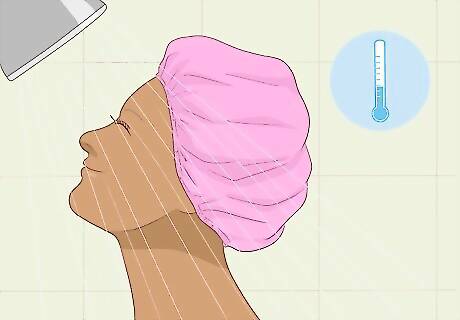
Hopping under a stream of icy-cool water will wake you right up. While this is a great one-time hack if you’re feeling sluggish one afternoon, taking a cold shower every morning will actually lead to a more consistent long-term energy levels as well. If you don’t have time for a full shower, at least splash some cold water on your face to give yourself a boost. It’s unclear why this works, but scientists believe it may have something to do with noradrenaline, a chemical that promotes nerve activity whenever you’re stimulated. The cold water may be literally energizing your nervous system!
Don’t skip breakfast.
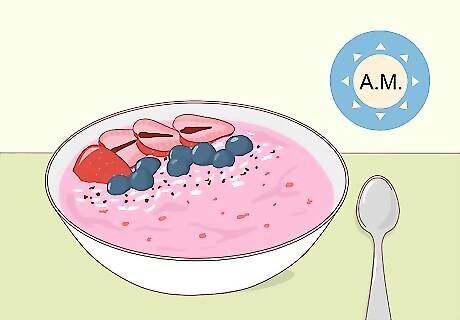
Eat a healthy breakfast every day before 10:00 am. Having something healthy to eat in the morning will kickstart your metabolism, which will help you maintain a consistent energy level throughout the day. It will also help you maintain a healthy weight, and keep your mood up. If you’re one of those people that really dislikes eating breakfast, try eating a later dinner. It’s usually not a good idea to skip the first meal of the day. However, if you do, a late dinner may help you stay energetic during the day.
Exercise.
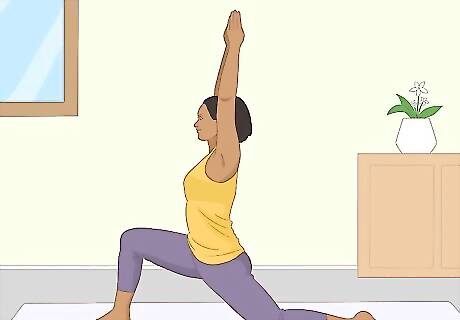
Get at least 150 minutes of exercise a week to maintain your energy. It sounds like a lot, but you can break that up into 15- to 30-minute chunks periodically over each week. Exercise will improve your mood, help you sleep better, and reduce stress, all of which will help you stay energized throughout the day. Low-impact, light exercise is probably better than something like weightlifting when it comes to managing low energy levels. Yoga is a great option for exercise if you’re also looking to tackle stress at the same time.
Take a break.
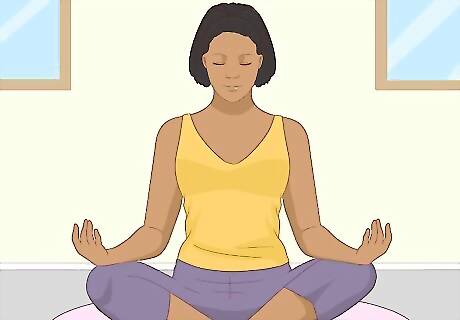
Stress will drain you, so don’t forget to take a breather periodically. Minimize your workload everyday so that you set aside time to chill out and do something you enjoy. Engage in some kind of mindfulness, like guided meditation, to help keep your stress levels in check. Trim the stuff on your daily to-do list that isn’t especially important and take a 5-minute break every hour or so to keep your energy levels stable. If you’re going through an especially stressful period at work or school, remember to step away every once in a while. It’s easy to get caught up in what you’re doing—especially if it’s important. If you tend to forget about breaks, try setting alarms on your phone to remind yourself!
Fix your sleep hygiene.
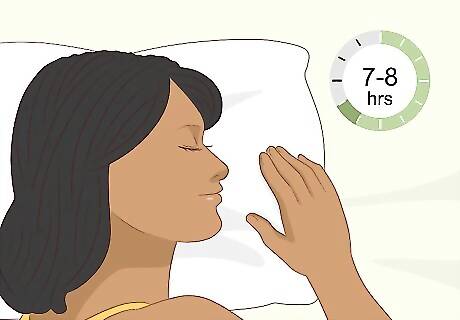
Most adults require 7-8 hours of sleep a night. If you’re not getting enough sleep, it may be totally throwing your energy levels out of whack. Sleep deprivation (and over-sleeping) will keep you feeling tired throughout the day. Try to go to bed and wake up at the same time every day, and avoid naps whenever possible. This is one of the best ways to keep your energy levels stable in the long run. Turn the thermostat down to a comfortable level, close the blinds, and use a white noise machine if you’d like. Whatever you can do to create a comfortable sleep environment is going to help you fall and stay asleep.
Pursue your passions.

It’s hard to be energetic if you don’t see value in your actions. Set aside time every week to participate in hobbies you enjoy, and try to do at least one thing that you find value in every day. This could be something as simple as being kind to a stranger in need, or something like learning a new instrument or taking dance classes. So long as you think it’s important, it’s worth doing. If you have something to look forward to, you’re naturally going to feel more energetic as you go about your day. The inverse is true as well; if you feel down about wasting your time with things you don’t care about, you’re going to feel a little fatigued.
Cut back on alcohol and nicotine.

Avoid alcohol before dinnertime and quit smoking if you smoke. Nothing is going to throw your natural energy levels out of whack faster than alcohol or nicotine. While a glass of wine or two at dinner isn’t a big deal, binging or daytime drinking is going to leave you sedated and low-energy. As fat as smoking goes, nicotine is a stimulant, and you’re going to feel a rollercoaster of high- and low-energy throughout the day if you smoke.




















Comments
0 comment